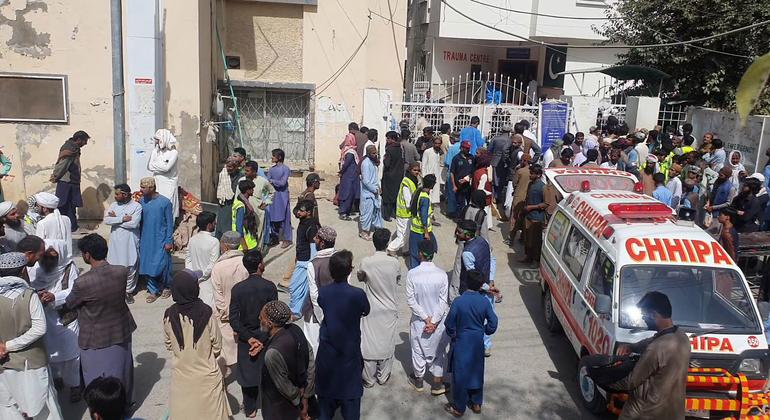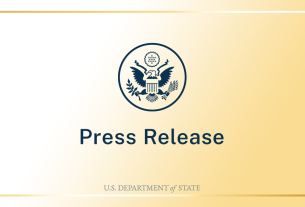Jama’at Nusrat al-Islam wal-Muslimin, an Al-Qaeda-affiliated group, claimed responsibility for the attack in Burkina Faso on August 24. The attacks in Pakistan, which took place on Wednesday, were claimed by the Balochistan Liberation Army (BLA).
Ben Saul, the UN Human Rights Council-appointed Special Rapporteur on protection of human rights while countering terrorism, urged both countries to investigate the crimes and prosecute the perpetrators through a fair trial.
“All counter-terrorism operations by police, security forces and the military must comply with human rights law, and international humanitarian law as relevant, including the right to life, freedom from arbitrary detention and enforced disappearance, freedom from torture and cruel, inhuman or degrading treatment, and civil and political rights,” he said.
Support victims
Mr. Saul also urged the governments in Burkina Faso and Pakistan to support the victims of the attacks.
“I encourage the Government of Burkina Faso to re-engage with the international community…to restore security, address the conditions leading to insecurity, and ensure respect for international humanitarian law,” he said.
Mr. Saul has advised the two governments on how to assist the victims and address terrorist violence.
Appointed by the Geneva-based Human Rights Council, Special Rapporteurs are mandated to monitor and report on country or thematic human rights situations. Serving independent of governments and the United Nations, the experts are not UN staff members and do not draw a salary.
Needs grow in Yemen amid catastrophic flooding, warns UN agency
Over to war-ravaged Yemen, where the UN refugee agency, UNHCR, warned that catastrophic flooding has created an even worse situation for the millions of displaced people in the country.
The agency reported that flooding, caused by the bursting of three dams due to heavy rains in Al Mahweet governorate in western Yemen, devastated entire communities.
In the past month, at least 97 lives were lost in the floods, with many more injured, UNHCR said. Over 56,000 homes across 20 governorates have been damaged or destroyed, displacing more than 1,000 families.
The hardest-hit areas include Hudaydah, Hajjah, Al-Taweela and Marib.
“Impassable roads are isolating affected areas and hampering rescue efforts,” the UN agency explained.
Basic needs unmet
Recent UNHCR assessments indicate that 85 percent of families in Yemen’s displaced and host communities are now unable to meet their daily food needs.
“Many have resorted to extreme coping mechanisms, such as reducing meal sizes or skipping meals altogether,” UNHCR emphasized, noting that “entire families” face hunger daily in Yemen.
Nearly a decade of conflict between the Government and opposition, mainly Houthi forces, has created one of the world’s worst humanitarian crises, with more than 18 million people – including 4.5 million displaced – urgently needing aid.
This figure includes over 60,000 refugees and asylum seekers, primarily from the Horn of Africa.
Libya: Mass graves at Tarhuna in human rights spotlight
Mass killings, sexual violence and abductions in the Libyan city of Tarhuna, dating back to 2013, continue to go unpunished, risking further instability and division in the country, the UN human rights office, OHCHR, has warned.
A new report from UN rights investigators details how an armed group that emerged in 2011, following the overthrow of longtime President Muammar Gaddafi, exercised brutal control over Tarhuna, a city of 150,000 people, about 65 kilometres (41 miles) southeast of Tripoli.
The Al-Kaniyat fighters’ crimes also included torture, ill-treatment and forced displacement between 2013 and 2022.
Failure to deliver justice
Speaking in Geneva on Friday, OHCHR spokesperson Seif Magango emphasized that the “failure to deliver justice” has led to renewed violence and serious rights violations in Tarhuna and surrounding areas. These findings echo an earlier report commissioned by the UN Human Rights Council.
“The 2022 Fact-Finding Mission report detailed evidence of atrocities committed in Tarhuna, including the discovery of mass graves containing hundreds of human remains, most of them handcuffed, blindfolded, and showing signs of torture,” he said.
“The report also warned of the possibility that there could be up to 100 more such mass burial sites.”
Mr. Magango added that Al-Kaniyat’s integration into the former Government of National Accord (GNA) and later the Libyan National Army (LNA) has been “a significant barrier” to accountability and justice.



